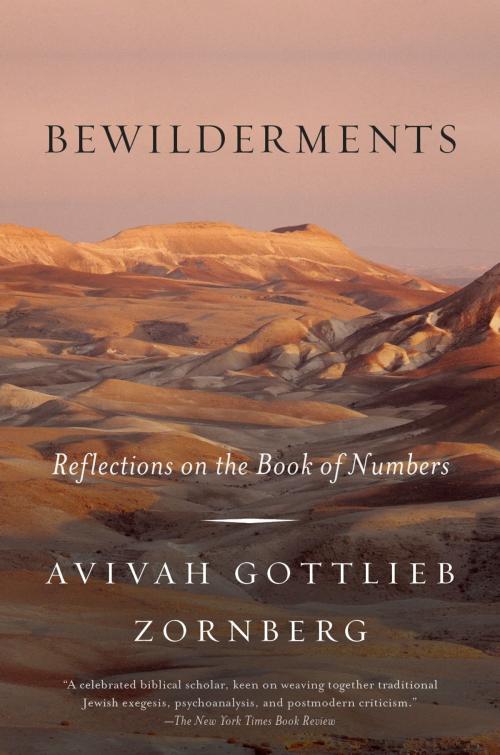Bewilderments
Reflections on the Book of Numbers
Nonfiction, Religion & Spirituality, Reference, Psychology of Religion, Judaism, Sacred Writings, Bible & Bible Studies, Criticism & Interpretation| Author: | Avivah Gottlieb Zornberg | ISBN: | 9780805243055 |
| Publisher: | Knopf Doubleday Publishing Group | Publication: | February 24, 2015 |
| Imprint: | Schocken | Language: | English |
| Author: | Avivah Gottlieb Zornberg |
| ISBN: | 9780805243055 |
| Publisher: | Knopf Doubleday Publishing Group |
| Publication: | February 24, 2015 |
| Imprint: | Schocken |
| Language: | English |
The newest book in Avivah Gottlieb Zornberg’s award-winning series of commentaries on the hebrew bible.
The book of Numbers is the narrative of a great failure. What should have been for the Israelites a brief journey from Mount Sinai to the Holy Land becomes a forty-year death march. Both before and after the devastating report of the Spies, the narrative centers on the people’s desire to return to Egypt, to undo the miraculous work of the Exodus. At its heart are speeches of complaint and lament, expressing a profound existential skepticism. But by contrast, in the narrative of the book of Numbers that is found in mystical and Hasidic sources, the generation of the wilderness emerges as one of extraordinary spiritual experience, receivers of the Torah to the fullest extent, fed on miracles and nurtured directly by God: a generation of ecstatic faith, human partners in an unprecedented conversation with the Deity. Drawing on kabbalistic sources, the Hasidic commentators on the book of Numbers depict a people who transcend prudent considerations in order to follow God into the wilderness, where their spiritual yearning comes to full expression.
This view of the wilderness history invites us into a different kind of listening to the many cries of distrust, lament, and resentment that issue from the Israelites throughout the book of Numbers. Is there a way to integrate this narrative of dark murmurings, of obsessive fantasies of return to Egypt, with the celebration of a love-intoxicated wilderness discourse? The question touches not only on the language the Israelites speak but also on the very nature of human utterance. Who are these people? Who are we who listen to them? What effect does the cumulative trauma of slavery, the miracles of Exodus, the revelation at Sinai, have on a nation that is beginning to speak? In Bewilderments, one of the most admired biblical commentators at work today posits fascinating answers to these questions through the magnificent literary, scholarly, and psychological analysis of the text that is her trademark.
The newest book in Avivah Gottlieb Zornberg’s award-winning series of commentaries on the hebrew bible.
The book of Numbers is the narrative of a great failure. What should have been for the Israelites a brief journey from Mount Sinai to the Holy Land becomes a forty-year death march. Both before and after the devastating report of the Spies, the narrative centers on the people’s desire to return to Egypt, to undo the miraculous work of the Exodus. At its heart are speeches of complaint and lament, expressing a profound existential skepticism. But by contrast, in the narrative of the book of Numbers that is found in mystical and Hasidic sources, the generation of the wilderness emerges as one of extraordinary spiritual experience, receivers of the Torah to the fullest extent, fed on miracles and nurtured directly by God: a generation of ecstatic faith, human partners in an unprecedented conversation with the Deity. Drawing on kabbalistic sources, the Hasidic commentators on the book of Numbers depict a people who transcend prudent considerations in order to follow God into the wilderness, where their spiritual yearning comes to full expression.
This view of the wilderness history invites us into a different kind of listening to the many cries of distrust, lament, and resentment that issue from the Israelites throughout the book of Numbers. Is there a way to integrate this narrative of dark murmurings, of obsessive fantasies of return to Egypt, with the celebration of a love-intoxicated wilderness discourse? The question touches not only on the language the Israelites speak but also on the very nature of human utterance. Who are these people? Who are we who listen to them? What effect does the cumulative trauma of slavery, the miracles of Exodus, the revelation at Sinai, have on a nation that is beginning to speak? In Bewilderments, one of the most admired biblical commentators at work today posits fascinating answers to these questions through the magnificent literary, scholarly, and psychological analysis of the text that is her trademark.















